Abstract
Inactivated simian immunodeficiency virus (SIV) grown in a human T-cell line induces protection from infection by the virus in macaques. However, observations that immunization with uninfected human T cells or with SIV-1 prepared in human T cells can also induce protection, has raised the possibility that protective antigens could be of human cellular origin. Sera from animals immunized with fixed infected and uninfected human T cells, as well as from animals immunized with partially purified cell-free SIV have been examined for their ability to bind to human and macaque peripheral blood mononuclear cells (PBMC) and to-components present in fetal calf serum (FCS) in which the cells were grown. Analysis by flow cytometry suggests that antibodies to human cell surface antigens can be elicited with both inactivated SIV grown in human T cells and by uninfected T cells. There was a significant association between the presence of anti-cell antibodies and protection from infection. However, anti-cell surface antibodies were not detected with macaque mononuclear cells by flow cytometry or by immunoprecipitation, unless these cells were first treated with FCS or activated by a mitogen. Immunoprecipitation of resting human PBMC with sera from immunized animals suggests the presence of antibodies to class I heavy and light chains [beta 2-microglobulin (beta 2 m)] and to bovine beta 2m, which may originate in FCS used to grow the cell line. Antibodies to CD4 were also found in sera from animals immunized with SIV grown in human T cells. We suggest that human cellular components augmented by FCS elicit anti-class I heavy chain, beta 2m, CD4 and FCS antibodies which may be responsible for protection against SIV infection in macaques.
Full text
PDF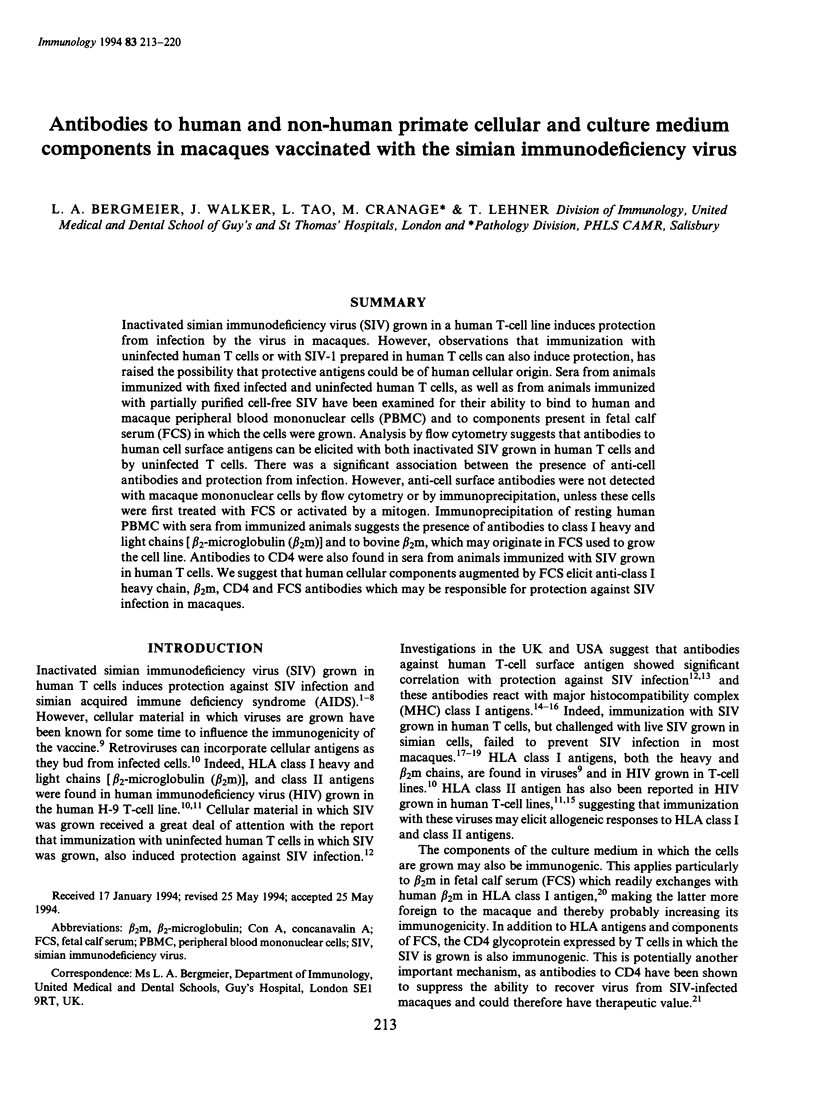
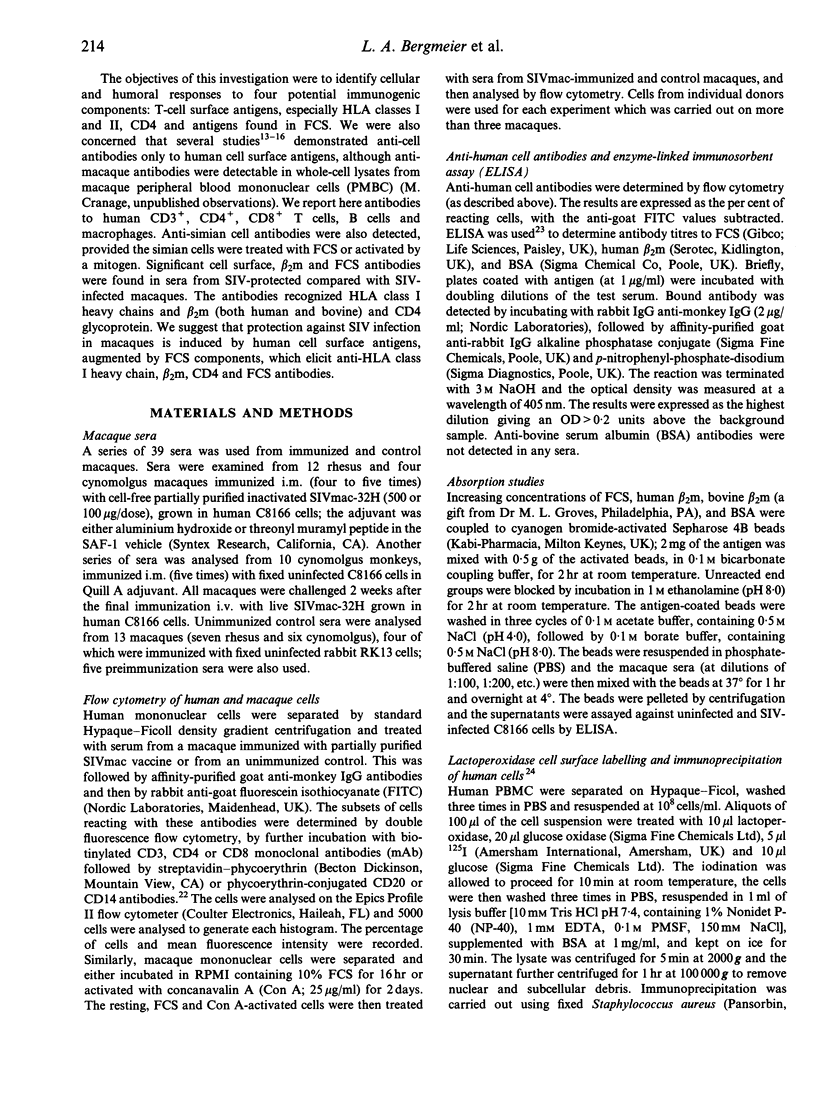
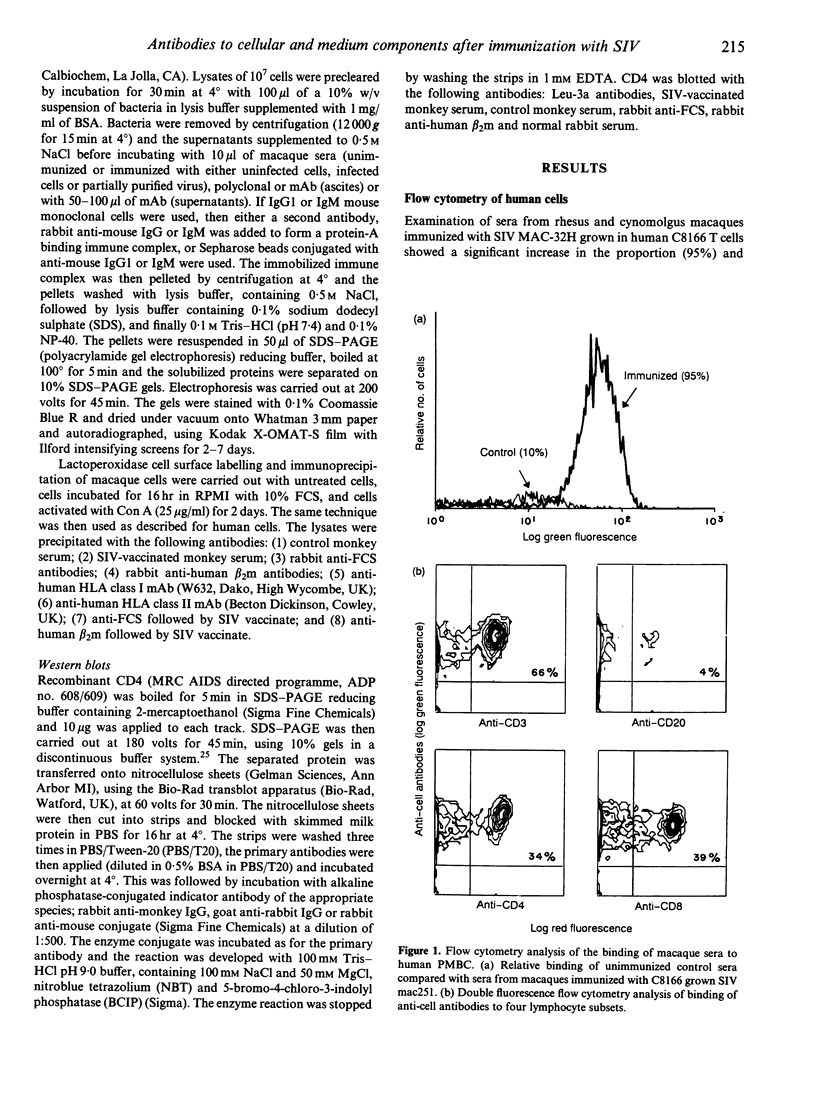
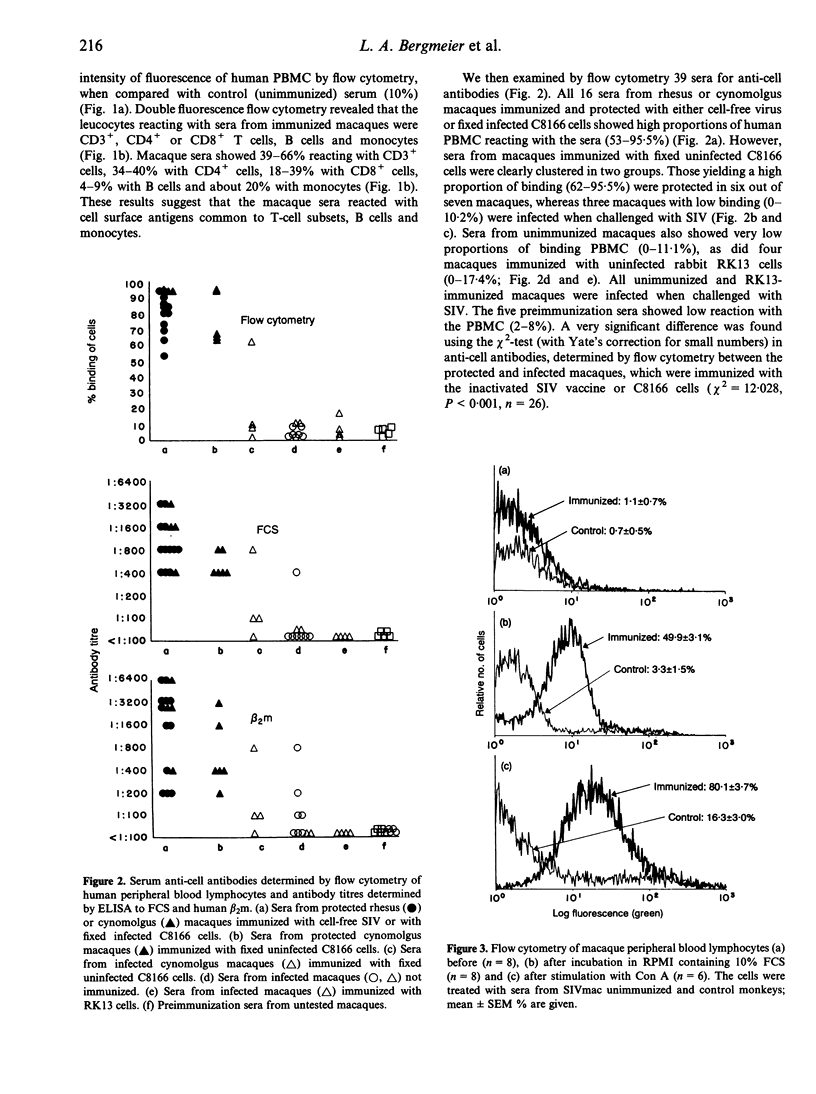
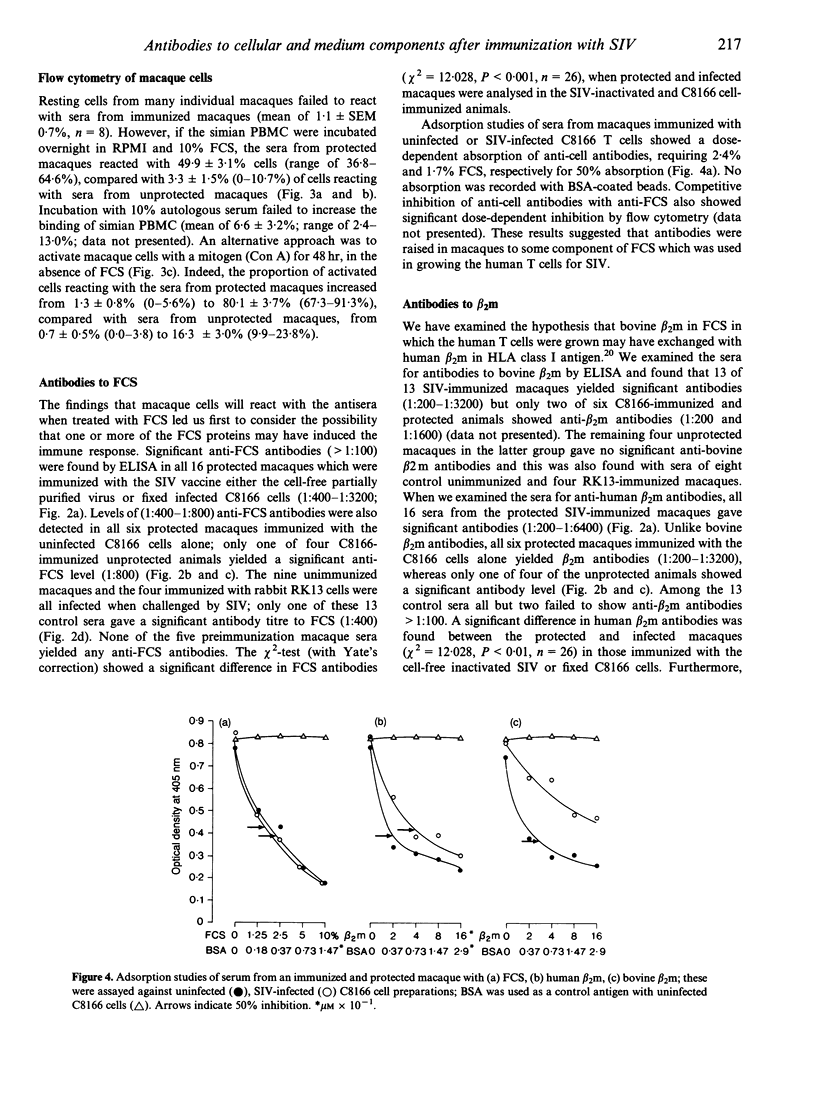
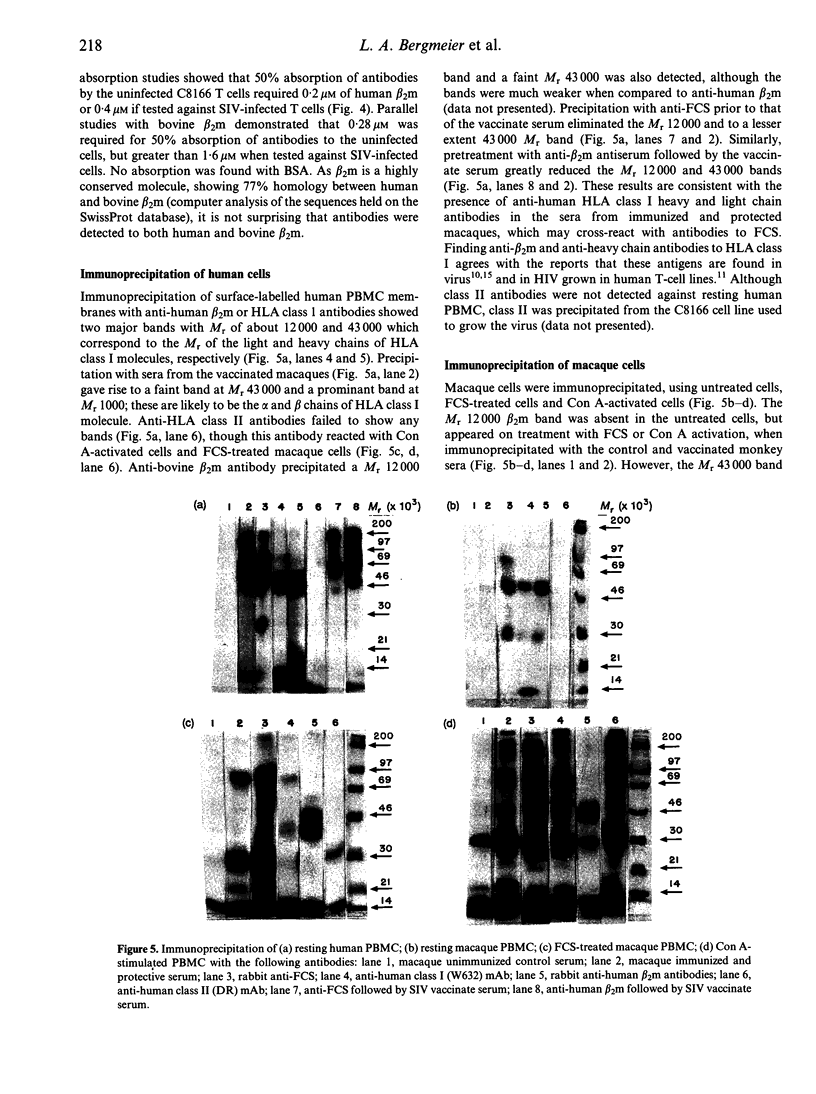
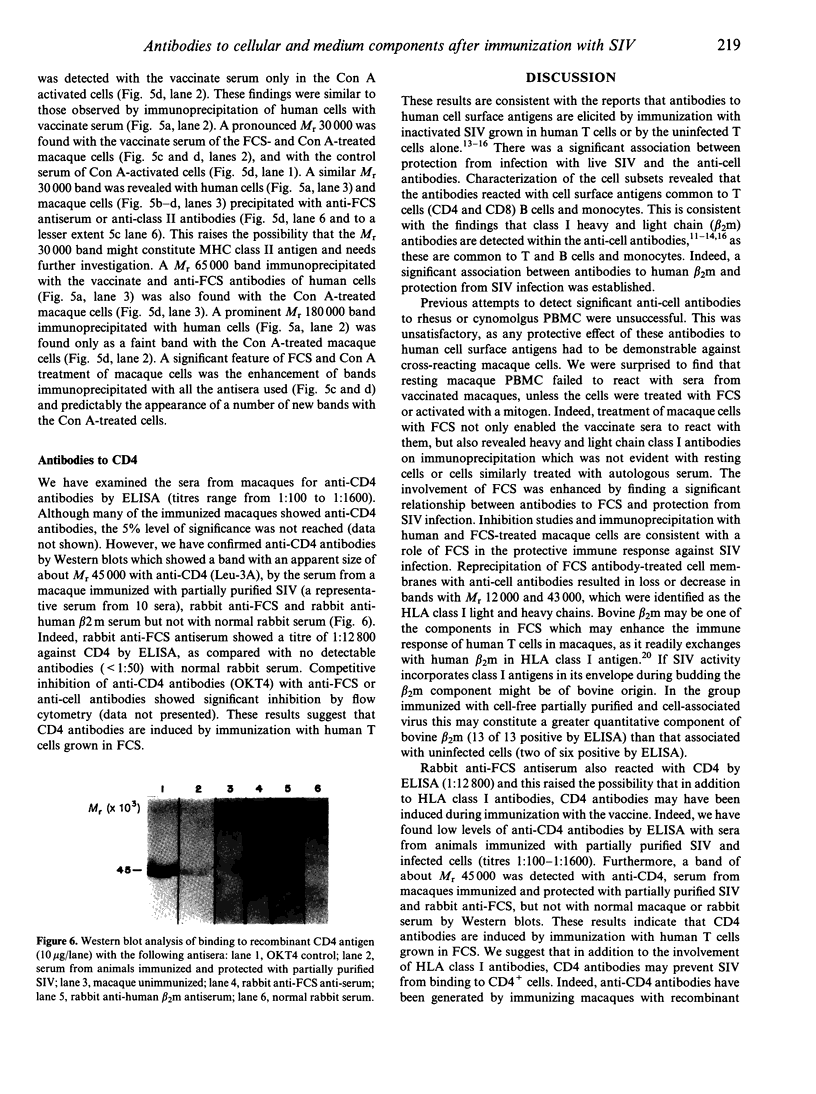
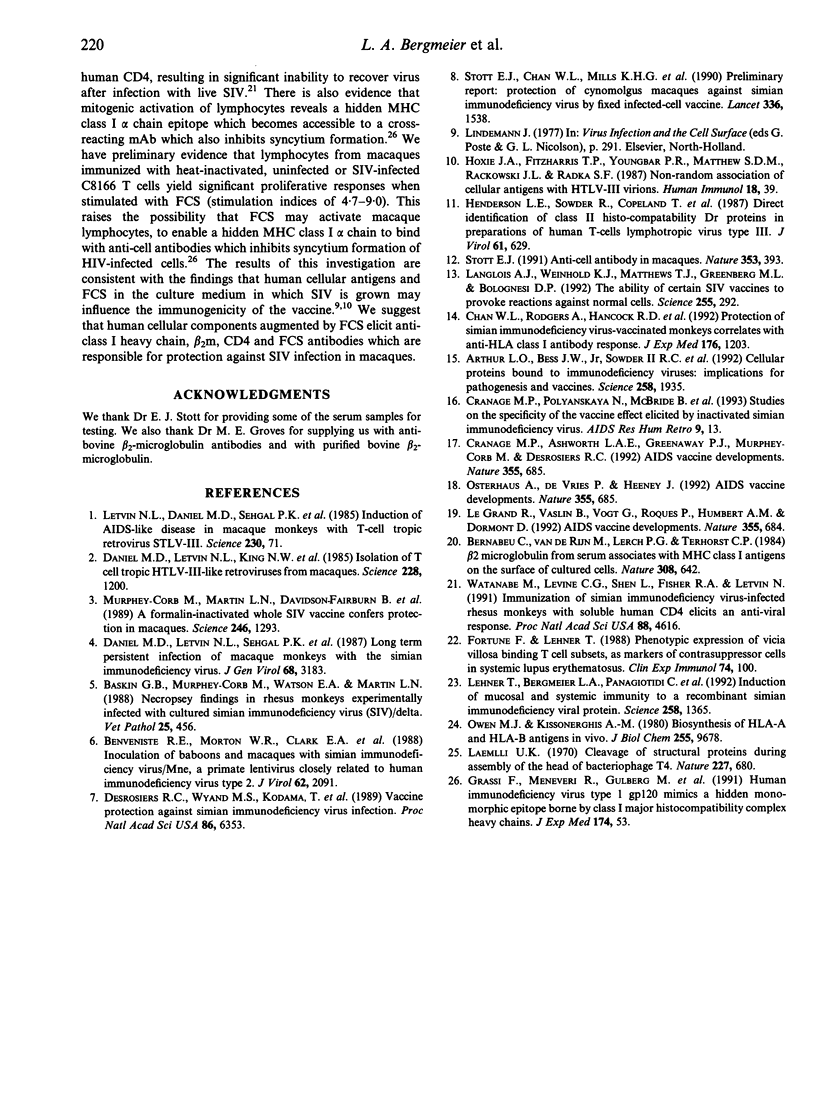
Images in this article
Selected References
These references are in PubMed. This may not be the complete list of references from this article.
- Arthur L. O., Bess J. W., Jr, Sowder R. C., 2nd, Benveniste R. E., Mann D. L., Chermann J. C., Henderson L. E. Cellular proteins bound to immunodeficiency viruses: implications for pathogenesis and vaccines. Science. 1992 Dec 18;258(5090):1935–1938. doi: 10.1126/science.1470916. [DOI] [PubMed] [Google Scholar]
- Baskin G. B., Murphey-Corb M., Watson E. A., Martin L. N. Necropsy findings in rhesus monkeys experimentally infected with cultured simian immunodeficiency virus (SIV)/delta. Vet Pathol. 1988 Nov;25(6):456–467. doi: 10.1177/030098588802500609. [DOI] [PubMed] [Google Scholar]
- Benveniste R. E., Morton W. R., Clark E. A., Tsai C. C., Ochs H. D., Ward J. M., Kuller L., Knott W. B., Hill R. W., Gale M. J. Inoculation of baboons and macaques with simian immunodeficiency virus/Mne, a primate lentivirus closely related to human immunodeficiency virus type 2. J Virol. 1988 Jun;62(6):2091–2101. doi: 10.1128/jvi.62.6.2091-2101.1988. [DOI] [PMC free article] [PubMed] [Google Scholar]
- Bernabeu C., van de Rijn M., Lerch P. G., Terhorst C. P. Beta 2-microglobulin from serum associates with MHC class I antigens on the surface of cultured cells. Nature. 1984 Apr 12;308(5960):642–645. doi: 10.1038/308642a0. [DOI] [PubMed] [Google Scholar]
- Chan W. L., Rodgers A., Hancock R. D., Taffs F., Kitchin P., Farrar G., Liew F. Y. Protection in simian immunodeficiency virus-vaccinated monkeys correlates with anti-HLA class I antibody response. J Exp Med. 1992 Oct 1;176(4):1203–1207. doi: 10.1084/jem.176.4.1203. [DOI] [PMC free article] [PubMed] [Google Scholar]
- Cranage M. P., Ashworth L. A., Greenaway P. J., Murphey-Corb M., Desrosiers R. C. AIDS vaccine developments. Nature. 1992 Feb 20;355(6362):685–686. doi: 10.1038/355685a0. [DOI] [PubMed] [Google Scholar]
- Cranage M. P., Polyanskaya N., McBride B., Cook N., Ashworth L. A., Dennis M., Baskerville A., Greenaway P. J., Corcoran T., Kitchin P. Studies on the specificity of the vaccine effect elicited by inactivated simian immunodeficiency virus. AIDS Res Hum Retroviruses. 1993 Jan;9(1):13–22. doi: 10.1089/aid.1993.9.13. [DOI] [PubMed] [Google Scholar]
- Daniel M. D., Letvin N. L., Sehgal P. K., Hunsmann G., Schmidt D. K., King N. W., Desrosiers R. C. Long-term persistent infection of macaque monkeys with the simian immunodeficiency virus. J Gen Virol. 1987 Dec;68(Pt 12):3183–3189. doi: 10.1099/0022-1317-68-12-3183. [DOI] [PubMed] [Google Scholar]
- Desrosiers R. C., Wyand M. S., Kodama T., Ringler D. J., Arthur L. O., Sehgal P. K., Letvin N. L., King N. W., Daniel M. D. Vaccine protection against simian immunodeficiency virus infection. Proc Natl Acad Sci U S A. 1989 Aug;86(16):6353–6357. doi: 10.1073/pnas.86.16.6353. [DOI] [PMC free article] [PubMed] [Google Scholar]
- Fortune F., Lehner T. Phenotypic expression of Vicia villosa binding T cell subsets, as markers of contrasuppressor cells in systemic lupus erythematosus. Clin Exp Immunol. 1988 Oct;74(1):100–104. [PMC free article] [PubMed] [Google Scholar]
- Grassi F., Meneveri R., Gullberg M., Lopalco L., Rossi G. B., Lanza P., De Santis C., Brattsand G., Buttò S., Ginelli E. Human immunodeficiency virus type 1 gp120 mimics a hidden monomorphic epitope borne by class I major histocompatibility complex heavy chains. J Exp Med. 1991 Jul 1;174(1):53–62. doi: 10.1084/jem.174.1.53. [DOI] [PMC free article] [PubMed] [Google Scholar]
- Henderson L. E., Sowder R., Copeland T. D., Oroszlan S., Arthur L. O., Robey W. G., Fischinger P. J. Direct identification of class II histocompatibility DR proteins in preparations of human T-cell lymphotropic virus type III. J Virol. 1987 Feb;61(2):629–632. doi: 10.1128/jvi.61.2.629-632.1987. [DOI] [PMC free article] [PubMed] [Google Scholar]
- Laemmli U. K. Cleavage of structural proteins during the assembly of the head of bacteriophage T4. Nature. 1970 Aug 15;227(5259):680–685. doi: 10.1038/227680a0. [DOI] [PubMed] [Google Scholar]
- Langlois A. J., Weinhold K. J., Matthews T. J., Greenberg M. L., Bolognesi D. P. The ability of certain SIV vaccines to provoke reactions against normal cells. Science. 1992 Jan 17;255(5042):292–293. doi: 10.1126/science.1549775. [DOI] [PubMed] [Google Scholar]
- Le Grand R., Vaslin B., Vogt G., Roques P., Humbert M., Dormont D. AIDS vaccine developments. Nature. 1992 Feb 20;355(6362):684–684. doi: 10.1038/355684a0. [DOI] [PubMed] [Google Scholar]
- Lehner T., Bergmeier L. A., Panagiotidi C., Tao L., Brookes R., Klavinskis L. S., Walker P., Walker J., Ward R. G., Hussain L. Induction of mucosal and systemic immunity to a recombinant simian immunodeficiency viral protein. Science. 1992 Nov 20;258(5086):1365–1369. doi: 10.1126/science.1360702. [DOI] [PubMed] [Google Scholar]
- Murphey-Corb M., Martin L. N., Davison-Fairburn B., Montelaro R. C., Miller M., West M., Ohkawa S., Baskin G. B., Zhang J. Y., Putney S. D. A formalin-inactivated whole SIV vaccine confers protection in macaques. Science. 1989 Dec 8;246(4935):1293–1297. doi: 10.1126/science.2555923. [DOI] [PubMed] [Google Scholar]
- Osterhaus A., de Vries P., Heeney J. AIDS vaccine developments. Nature. 1992 Feb 20;355(6362):684–685. doi: 10.1038/355684b0. [DOI] [PubMed] [Google Scholar]
- Owen M. J., Kissonerghis A. M., Lodish H. F. Biosynthesis of HLA-A and HLA-B antigens in vivo. J Biol Chem. 1980 Oct 25;255(20):9678–9684. [PubMed] [Google Scholar]
- Stott E. J. Anti-cell antibody in macaques. Nature. 1991 Oct 3;353(6343):393–393. doi: 10.1038/353393a0. [DOI] [PubMed] [Google Scholar]
- Stott E. J., Chan W. L., Mills K. H., Page M., Taffs F., Cranage M., Greenaway P., Kitchin P. Preliminary report: protection of cynomolgus macaques against simian immunodeficiency virus by fixed infected-cell vaccine. Lancet. 1990 Dec 22;336(8730):1538–1541. doi: 10.1016/0140-6736(90)93310-l. [DOI] [PubMed] [Google Scholar]
- Watanabe M., Levine C. G., Shen L., Fisher R. A., Letvin N. L. Immunization of simian immunodeficiency virus-infected rhesus monkeys with soluble human CD4 elicits an antiviral response. Proc Natl Acad Sci U S A. 1991 Jun 1;88(11):4616–4620. doi: 10.1073/pnas.88.11.4616. [DOI] [PMC free article] [PubMed] [Google Scholar]




